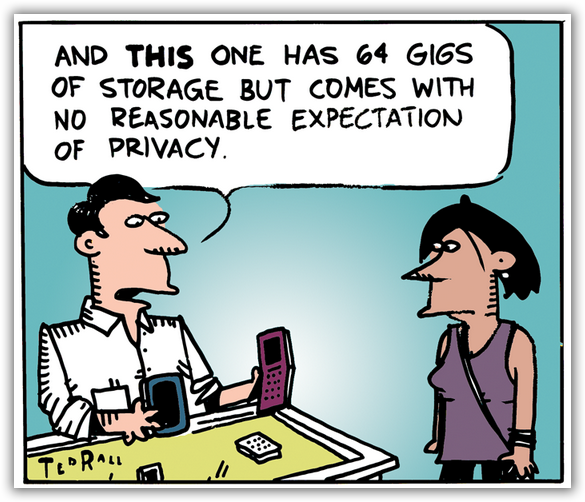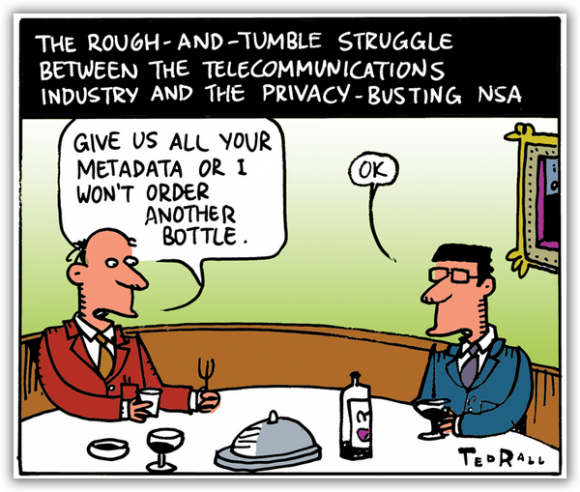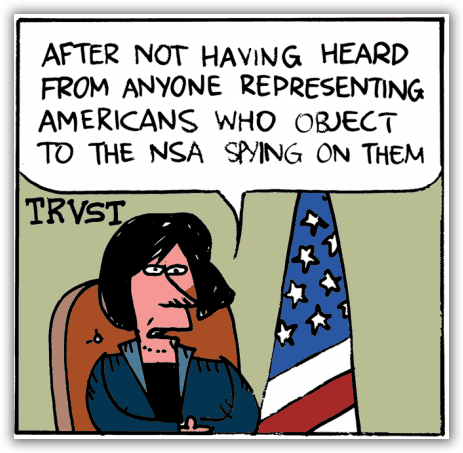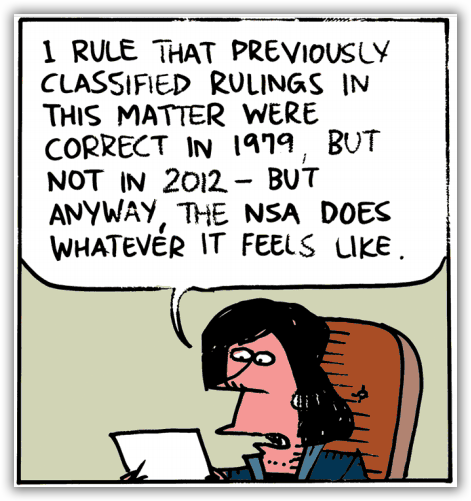aNewDomain.net-– Our Pulitzer-nominated political cartoonist and commentator Ted Rall is outraged at the latest specter the National Security Agency’s (NSA’s) PRISM e-surveillance project raises. A recent ruling that renews call-logging isn’t just about the expectation of privacy and the lack thereof. It’s about rational thinking — and the death of logic. In the following original column and gallery of his original toons for aNewDomain, Ted Rall expounds.
Forget, for a moment, the privacy issue. What happened to logic?
The Foreign Intelligence Surveillance Court is a bizarre Star Chamber. It’s a secret panel of federal judges who, as a side gig, sign off on requests by the NSA and other government agencies to spy on the personal communications of Americans, with no one to check or balance the government employees.
 No wonder the FISA court approves 99 percent of government requests. The secret FISA court hears only one side of the story, the prosecution. It never hears from the defense — the defense of the victims of government spying.
No wonder the FISA court approves 99 percent of government requests. The secret FISA court hears only one side of the story, the prosecution. It never hears from the defense — the defense of the victims of government spying.
FISA-court defenders deny the body is a rubber stamp, pointing out that in one out of four cases, judges work with the spooks and spies, editing back and forth, before signing off with decisions.
Judges in constitutional, above-board courts featuring adversarial proceedings don’t do this. They can’t.
Worse still, the FISA court’s opinions are classified. Following the June 2013 leaks about NSA PRISM from ex-NSA contractor Edward Snowden, the Obama Administration has released a few legal opinions. The latest one came out Friday, and it reveals that a lot more than personal freedoms have been lost in the age of Bush-Obama. And it shows that too many Americans have lost the ability to think straight.
Among the cavalcade of surveillance programs revealed by Snowden was a “call-log metadata” operation, in which the NSA sweeps up and stores detailed information about every phone call made in the United States. This includes the kind of thing you see on your bill — the numbers of the caller and recipient, time of the call and its duration — as well as the unique serial number of the phones being used and the exact location of the participants.
Obama officials downplay the significance of this data, but it’s incredibly powerful. An appellate court discussing GPS data collected from cell phones — which is less detailed than metadata — recently noted:
A person who knows all of another’s travels can deduce whether he is a weekly churchgoer, a heavy drinker, a regular at the gym, an unfaithful husband, an outpatient receiving medical treatment, an associate of particular individuals or political groups, and not just one such fact about a person, but all such facts.”
At this point I need you to follow me a little way down the legal rabbit hole.
The newly-released opinion from the Obama administration was written by Mary A. McLaughlin, 67, a federal jurist for Pennsylvania’s Eastern District for the last 14 years, ever since former U.S. President Bill Clinton appointed her.
The opinion renews the call metadata program, which must be reviewed by the FISA court every 90 days. What’s interesting is that her opinion specifically endorses the legal opinion of her colleague, Judge Claire V. Eagan, the previous judge who approved extending it.
Eagan, 63, of Oklahoma’s Northern District, was roundly criticized because she’d ignored a 2012 U.S. Supreme Court ruling in a case, United States vs. Jones, in which the court banned police from placing a GPS tracking device on a suspect’s automobile or person without a warrant. She relied instead on Smith vs. Maryland (1979), in which, according to The New York Times, “the Supreme Court held that call records were not protected by the Fourth Amendment because suspects had exposed that metadata to their phone companies and had no reasonable expectation of privacy.”
Check out this passage from the 1979 ruling:
It is doubtful that telephone users in general have any expectation of privacy regarding the numbers they dial, since they typically know that they must convey phone numbers to the telephone company and that the company has facilities for recording this information and does in fact record it for various legitimate business purposes.”
Due to that reasoning back in 1979, when disco was still the thing, the NSA knows whether you’ve been naughty or nice.
I find this reasoning, revised via Judges Eagan and McLaughlin, either of whom might someday be appointed to the U.S. Supreme Court, fascinating.
At its essence, it boils down to the following: Beth tells Mary a secret, which Mary records in her diary. After John surrepticiously reads Mary’s diary, he tweets and blogs and otherwise disseminates Mary’s secret. According to the twisted logic of the ’79 Supremes and Judges Eagan and McLaughlin, Beth has no reason to be pissed off at John, much less Mary. After all, once she told Mary her secret, she no longer had a reasonable “expectation of privacy.”
If I expose my naked body to my wife, have I relinquished my expectation of privacy because I have done so knowingly? If so, may she then secretly take photos of me and sell them to some pervert — a pervert with a rare, unseemly interest in middle-aged cartoonists?
Actually, it’s worse than that.
When people make phone calls, they don’t consciously “expose” their metadata to the phone company — certainly not in a way that intentionally relinquishes our expectation of privacy.

In the back of our minds, of course we know the phone company has our data; it needs to know where and who we are, and who and where we’re calling, so it can place our call and bill us for it. But most of us assume that the phone company safeguards this information. If I’d thought about it — and why would I? — I would have assumed that they destroyed it after a while. No one knew — not before Edward Snowden, anyway — that companies like Verizon and AT&T routinely handed over my personal calling records to the NSA. No one knew outside the tech companies involved.
To torture my metaphor a little longer, this is what the NSA’s metadata program is really like: Beth, who is married, carries on an affair with John, who is also married. Beth isn’t worried about getting caught; John has as much incentive to keep her secret as she does. But John (he’s the phone company) is an asshole. He tells his buddy Bob all about him and Beth. And Bob is an even bigger asshole than John, posting all about it online. Does Beth have cause to hate, or even sue John? Of course she does. She certainly has cause to go after Bob (here playing the role of the NSA).
Think of those paparazzi photos of starlets hanging out at a topless beach or on the deck of a yacht. Clearly, due diligence is called for when taking off your top outdoors. Scan the environs for gawkers. Beware of cameras and cell phones pointed your way. But the paparazzi use telephoto lenses. They’re far away. The actresses in question have no way to know their boobs are about to wind up in the pages of a Murdoch-owned tabloid. Courts sometimes agree, sometimes not, but logic and decency dictate that these women’s reasonable expectations of privacy have been violated.
So has ours. Why can’t experienced federal judges see that? How much privacy is reasonable to expect? That’s debatable — we’re doing that now. But I’m pretty sure that most Americans, who want the government out of their personal lives, are on the same page as I am.


For aNewDomain.net, I’m Ted Rall.
Based in Boston, Ted Rall is a nationally-syndicated columnist, editorial cartoonist and war correspondent who specializes in Afghanistan and Central Asia. The author of 17 books, most-recently published The Book of Obama: How We Went From Hope and Change to the Age of Revolt, Rall is twice the winner of the Robert F. Kennedy Journalism Award and is a Pulitzer Prize finalist. Follow him @TedRall, check out his Facebook fan page and definitely follow his Google+ stream here. Ted’s upcoming book After We Kill You, We Will Welcome You As Honored Guests: Unembedded in Afghanistan is due out in 2014.













No even I have to call baloney on this one. Seriously? It is ridiculous our digital communications are unprotected and exposed to government surveillance by virtue of a court ruling in the 1970s.
Not like technology has advanced at all since then or anything.
Even back in 1979, I doubt it was true that most Americans had no expectation of privacy when they made a phone call.
[…] Ted Rall: Down the NSA Rabbit Hole, FISC News and the Death of Reason by Ted Rall […]